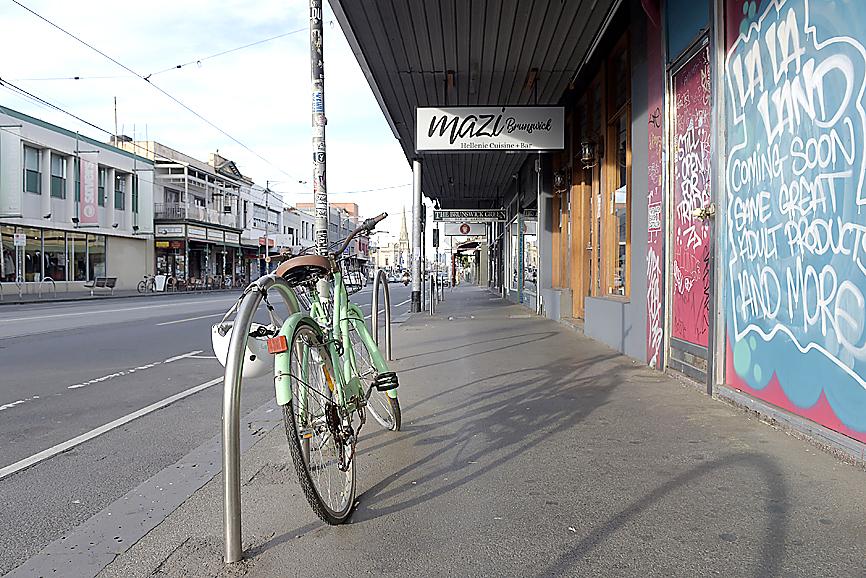Australia house prices fell the most in 16 months last month and face “significant” downside risk as mortgage holidays and government wage subsidies expire in coming months.
Property values in major cities fell 0.8 percent last month, the steepest decline since February last year, CoreLogic Inc data released yesterday showed.
The slide was led by Perth and Melbourne, which is at the center of a new spike in COVID-19 cases that has prompted the government to lock down parts of the city.

Photo: Bloomberg
“Despite the early signs of improved economic activity and a lift in housing turnover, the downside risk remains significant,” CoreLogic head of research Tim Lawless said. “The recent rise of active virus cases in Victoria is a reminder that the potential risk of a second wave remains a stark reality.”
The housing market faces a further test later this year, when current extraordinary levels of government and bank assistance start to wind down.
More than 485,000 home borrowers are on payment holidays, while about 3.5 million workers are on government wage subsidies, with both programs helping avoid the need for forced sales that could push down prices.
The wage subsidies are set to end in September, while banks might also toughen up criteria for borrowers wanting to extend the initial six-month payment deferrals.
“Eventually, the economy and borrowers will need to abide by market forces,” Lawless said. “This is when we could see a rise in mortgage arrears and the potential for a lift in urgent or forced sales.”
While Australia’s relative success in containing the virus means the economy is reopening quicker than in many other countries, the after-effects might linger for years.
A second wave of infections that slows or reverses the reopening could also set back the recovery.

NEW IDENTITY: Known for its software, India has expanded into hardware, with its semiconductor industry growing from US$38bn in 2023 to US$45bn to US$50bn India on Saturday inaugurated its first semiconductor assembly and test facility, a milestone in the government’s push to reduce dependence on foreign chipmakers and stake a claim in a sector dominated by China. Indian Prime Minister Narendra Modi opened US firm Micron Technology Inc’s semiconductor assembly, test and packaging unit in his home state of Gujarat, hailing the “dawn of a new era” for India’s technology ambitions. “When young Indians look back in the future, they will see this decade as the turning point in our tech future,” Modi told the event, which was broadcast on his YouTube channel. The plant would convert

‘SEISMIC SHIFT’: The researcher forecast there would be about 1.1 billion mobile shipments this year, down from 1.26 billion the prior year and erasing years of gains The global smartphone market is expected to contract 12.9 percent this year due to the unprecedented memorychip shortage, marking “a crisis like no other,” researcher International Data Corp (IDC) said. The new forecast, a dramatic revision down from earlier estimates, gives the latest accounting of the ongoing memory crunch that is affecting every corner of the electronics industry. The demand for advanced memory to power artificial intelligence (AI) tasks has drained global supply until well into next year and jeopardizes the business model of many smartphone makers. IDC forecast about 1.1 billion mobile shipments this year, down from 1.26 billion the prior

People stand in a Pokemon store in Tokyo on Thursday. One of the world highest-grossing franchises is celebrated its 30th anniversary yesterday.

Zimbabwe’s ban on raw lithium exports is forcing Chinese miners to rethink their strategy, speeding up plans to process the metal locally instead of shipping it to China’s vast rechargeable battery industry. The country is Africa’s largest lithium producer and has one of the world’s largest reserves, according to the US Geological Survey (USGS). Zimbabwe already banned the export of lithium ore in 2022 and last year announced it would halt exports of lithium concentrates from January next year. However, on Wednesday it imposed the ban with immediate effect, leaving unclear what the lithium mining sector would do in the